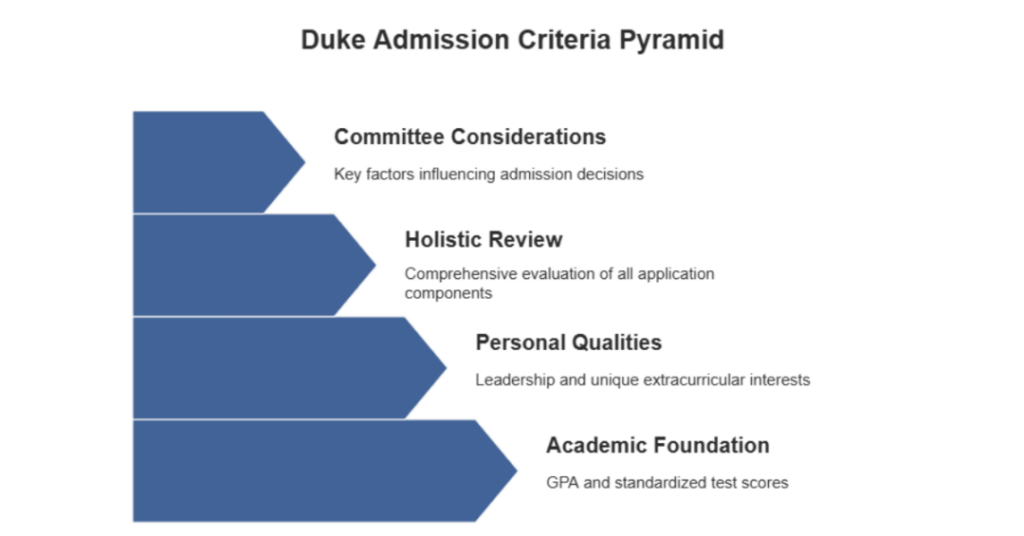7 July 2025
4 minutes read
What Is An Average GPA At Duke University For Admission Requirements For Indian Students?

Key Takeaways
- To be competitive for Duke University, aim for a Duke GPA of 4.13 or higher, but remember GPA alone won’t secure your admission.
- Duke’s holistic process values 1510+ SAT scores, strong extracurriculars, and standout letters of recommendation.
- Balancing academic excellence with leadership and unique experiences is key to standing out in Duke’s highly selective admissions process.
Duke University, one of the most selective schools in the nation, boasts an acceptance rate of just 6%. With the average alumnus GPA sitting around 4.13, it’s no surprise that prospective applicants feel the pressure to meet incredibly high standards. Numbers like these can make the dream of getting into Duke seem out of reach for many.
The harsh reality? A great GPA and hitting an average SAT score alone won’t guarantee admission. Many students with near-perfect GPAs still face rejection. Duke’s admission procedure takes a holistic approach, factoring in SAT scores (with an average around 1510), letters of recommendation, and extracurriculars. To get into Duke, you’ll need more than just grades—you’ll need to stand out in every aspect.
What Does Duke University Look For In Admission Requirements?
While a cumulative GPA of 4.13 or higher is common among admitted students, it’s essential to understand that Duke’s admissions committee takes a holistic approach. This means they consider a range of factors beyond just grades. A strong SAT score, typically around the 75th percentile of 1510 or higher, impressive extracurricular activities, and academic letters of recommendation are all key components to boosting your chances of getting admitted.

To help you better understand Duke’s admission requirements, we’ve broken down the essential criteria in the table below:
| Admission Criteria | Details |
|---|---|
| Cumulative GPA | 4.13 or higher (Weighted GPA) |
| Minimum GPA Requirement | Duke does not specify a minimum GPA, but anything below 3.9 places you below average. |
| Unweighted GPA | Typically between 3.9 and 4.0 |
| SAT Score | 25th percentile: 1510, 75th percentile: 1560 |
| ACT Scores | 33-35 (75th percentile) |
| Letters of Recommendation | Strongly required and weighed heavily in admission decisions |
| Extracurriculars | Must show leadership and unique interests in areas like public policy and arts |
| Holistic Application Process | Involves reviewing academic achievements, personal essays, extracurriculars, and recommendations |
| Admissions Committee Considerations | SAT requirement and GPA, extracurriculars, leadership roles, essays, and letters of recommendation |
| Schools at Duke | Trinity College of Arts & Sciences, Sanford School of Public Policy |
What’s The Average GPA Requirement At Duke University?
The average GPA requirement at Duke University is exceptionally high, with admitted students typically having a weighted GPA of 4.13 or higher. This places most applicants well within the top of their high school class. Duke doesn’t officially state a minimum GPA requirement, but if your unweighted GPA is below 3.9, your chances of getting admitted drop significantly. In fact, Duke is so competitive that even students with near-perfect GPAs need other standout qualities, like strong SAT scores and extracurricular achievements, to stay competitive in the application process.
A 4.13 GPA means the school expects you to be taking advanced courses like AP or IB classes, where weighted GPAs can push beyond a 4.0 scale. Achieving this GPA or higher ensures you’re competing on par with other applicants, but it’s important to remember that GPA alone won’t secure your spot. Duke’s admission process is holistic, so while your GPA is vital, a stellar SAT score, meaningful extracurriculars, and impressive letters of recommendation also play a crucial role in your chances of admission.
10 Other GPA Centric Universities In The USA
For students aiming for top universities in the U.S., GPA is a critical factor in the admission process. Many prestigious institutions set high academic standards, expecting applicants to demonstrate a strong cumulative GPA alongside other credentials. While Duke University is one such example, several other U.S. universities place a significant emphasis on GPA during admissions. These institutions often have highly competitive environments and seek students who excel not only academically but also in leadership and extracurricular activities.
| University | QS Ranking (2024) | Average Annual Tuition Fees (USD) | Average Salary Post-Graduation (USD) |
|---|---|---|---|
| Stanford University | 3 | $56,169 | $100,000+ |
| Harvard University | 4 | $54,768 | $120,000+ |
| Massachusetts Institute of Technology (MIT) | 1 | $57,590 | $120,000+ |
| Princeton University | 9 | $56,010 | $95,000+ |
| University of Chicago | 10 | $60,963 | $90,000+ |
| California Institute of Technology (Caltech) | 6 | $58,680 | $115,000+ |
| Yale University | 8 | $59,950 | $92,000+ |
| Columbia University | 12 | $65,524 | $95,000+ |
| University of Pennsylvania | 13 | $61,710 | $100,000+ |
| Northwestern University | 24 | $60,276 | $95,000+ |
Conclusion
In the end, getting into Duke University, or any other top-tier school, is about more than just hitting a GPA target. Sure, the average GPA of 4.13 tells you Duke is looking for top academic performers, but that’s just the beginning. Duke’s holistic admissions process means they’re equally interested in who you are outside of your grades—your SAT scores, extracurriculars, and personal achievements all matter just as much.
And let’s be real—Duke, like other elite universities, is highly competitive. Even with near-perfect numbers, you need to stand out. The key is balance. Focus on showcasing your unique strengths, leadership experiences, and passion for what you do, and that’s what will set you apart. At the end of the day, it’s not just about fitting into the mold; it’s about proving that you’ll thrive in Duke’s dynamic and challenging environment students who are not just academically capable but also ready to contribute their unique perspectives and talents to the university community.
Explore a world of learning in the USA with Ambitio! Engage with the brightest minds, define your path, and discover your career. Join us for an adventure beyond books – Study in USA. They Secured Their Dream. Are You Next? Dive into the success stories of students who’ve secured spots in some of the most prestigious institutions in the USA. Get inspired, compare profiles, and discover what it takes to join the ranks of these top admits.
FAQs
What is the minimum GPA requirement for Duke University?
Duke does not officially report a minimum GPA requirement, but the average GPA of admitted students is typically around 4.13.
Does Duke prefer the SAT or the ACT?
Duke accepts both SAT and ACT scores and does not have a preference for one over the other.
How important are SAT scores compared to GPA for Duke admissions?
Both SAT scores and GPA are critically important in Duke’s admissions process, but the university also evaluates other factors like extracurriculars and essays.
Can I get into Duke with a GPA lower than 4.0?
Yes, it’s possible to get into Duke with a GPA lower than 4.0, especially if you have strong SAT/ACT scores and other compelling application components.
What should I do if my GPA is not competitive for Duke?
If your GPA is not as high as Duke’s average, focus on strengthening other areas of your application, such as your SAT/ACT scores, essays, and extracurricular activities.

You can study at top universities worldwide!
Get expert tips and tricks to get into top universities with a free expert session.
Book Your Free 30-Minute Session Now! Book a call now




























